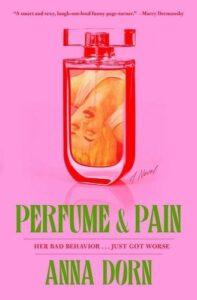
If you like to read about messy lesbians making terrible decisions, this is the book for you. It's also the perfect set piece for reading in public while sipping an iced lavender latte, though I must admit I was not then approached by a toxic lesbian who would briefly ruin my life. Maybe next time.
Personally, I love reading about deeply flawed sapphic characters-though Astrid would hate being called sapphic rather than lesbian. When I heard this was an homage to lesbian pulp fiction, I had to pick it up. I would say that characterization is fair: even without the mentions of lesbian pulp books and authors, this is melodramatic bordering on campy, so it does remind me of those 1960s stories.
I was conflicted while reading this, both reveling in Astrid's terrible decisions and rolling my eyes at her opinions. She seems to believe no sexual identity is more subversive or underrepresented than two white femme lesbians having sex. She thinks bisexual, queer, and nonbinary identities are corporate and bland, on the other hand. Her insufferable opinions and personality are part of the appeal of this book, but I also found the constant biphobia so boring and outdated that it took me out of the story.
Astrid is a semi-successful novelist who is currently taking time off from writing to "get well" after her constant drug use-her preference is for a combination of amphetamines, alcohol, and cigarettes she calls the Patricia Highsmith-and inability to keep herself from voicing every thought that flits through her head result in her being sort of but not really cancelled. She can't ignore her urge to self-medicate for very long, though, including by chasing toxic, obsessive relationships with women.
This is the kind of book that makes you want to google the author immediately afterwards. When Astrid has an adaptation made of her book, she insists the main character isn't her, to the producer's skepticism. Astrid may not be Anna, but it's easy to see at least some overlap: they both wrote lesbian novels about astrologers, they both are fans of the Kardashians, and Dorn mentions in interviews that this book was inspired by her own concerns about turning 35-namely that her bad behavior had ceased to be considered "cute". A quick scroll through the author's social media also includes posts that Astrid would also share.
If the premise intrigues you, I do recommend Perfume and Pain, as long as you're aware that the main character has bad opinions. Content warnings for biphobia, ableism, drinking and driving, homophobic slurs, heavy drug and alcohol use (to the point of blackouts), among others. I did really enjoy reading this, even though I was rolling my eyes at Astrid half the time. On the other hand, I can confidently say I won't be picking up any other titles by this author: spiraling downwards alongside a character like this is fun once, but just like reading lesbian pulp cover-to-cover, it's not something I feel the urge to do again any time soon.
